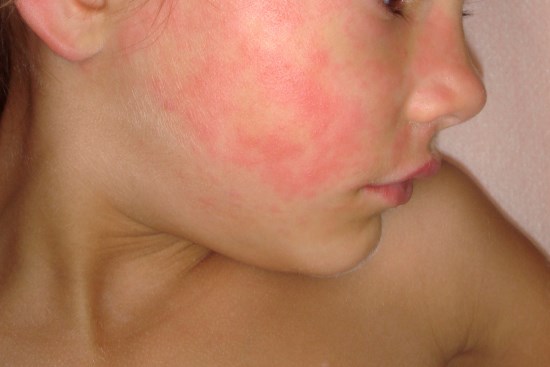About slapped cheek disease or fifth disease
Slapped cheek disease is a mild viral infection caused by parvovirus B19. This virus spreads when you touch or breathe in droplets from an infected person’s cough or sneeze.
Outbreaks generally happen in early spring.
Slapped cheek disease most commonly affects children aged 5-15 years.
Slapped cheek disease is also called fifth disease or erythema infectiosum.
Slapped cheek disease symptoms
The first symptoms of slapped cheek disease usually appear around 2 weeks after infection with parvovirus.
These are usually fever, headache and a runny nose.
Once these symptoms start to ease, a distinctive rash comes up on the face. The rash might look red on light skin or brown, grey or purple on dark skin. It makes children look like their cheeks have been slapped. The rash then spreads to the chest, tummy, back, arms and legs but not the palms and soles. The rash isn’t usually itchy.
At first the rash looks blotchy, but as the centre clears, it starts to look lacy.
By the time the rash has appeared, your child is usually no longer sick. It might take 1-3 weeks for the rash to clear entirely. Overheating, exercise or sunlight can make the rash look worse. The rash might come and go for a while. Sometimes it comes and goes for several months.
Other symptoms of slapped cheek disease can include red eyes, swollen lymph nodes, sore throat and diarrhoea.
Older children might complain of joint swelling or pain too.

Parvovirus is most contagious 2 weeks before symptoms appear. Your child isn’t usually contagious once the rash has appeared.
Complications of slapped cheek disease
Complications of slapped cheek disease include anaemia. This is because parvovirus affects blood cells.
Complications are very rare in healthy children and teenagers.
Some children are at higher risk of complications from slapped cheek disease. They include children who have:
- red blood cell problems like severe anaemia or sickle cell disease.
- a weakened immune system because of a medical condition or medical treatment.
Parvovirus can be dangerous for unborn babies. If you’re pregnant and you’ve become infected or you’ve come into contact with someone with the virus, you should see your midwife or doctor immediately for blood tests and monitoring of your pregnancy.
Medical help: when to get it for children with slapped cheek disease
You should take your child to the GP if your child:
- develops a rash and you’re not sure what’s causing it or the rash doesn’t temporarily disappear with pressure
- has a fever that doesn’t settle after 48 hours
- has sore or swollen joints
- develops a rash and has red blood cell problems or a weakened immune system
- shows signs of being unwell.
You know your child best. If your child seems unwell, seek medical attention.
Treatment for slapped cheek disease
Rest at home might be all your child needs.
You can use pain relief like paracetamol or ibuprofen if your child is feeling uncomfortable.
Don’t give aspirin to children under 12 years unless it’s prescribed by a doctor. Aspirin can increase the risk of Reye’s syndrome, a rare but potentially deadly condition. If you’re giving your child any over-the-counter medicines, check with your pharmacist or doctor to make sure these have no aspirin.
Prevention of slapped cheek disease
There’s no immunisation for slapped cheek disease.
Good daily hygiene and careful hand-washing at child care, preschool and school helps prevent spread of the disease, but there’s nothing else you can do to stop it spreading.
There’s no need to keep your child home from child care, preschool or school if they have a rash from slapped cheek disease because they probably aren’t contagious anymore. But keep your child at home if they’re feeling unwell with symptoms like fever.
If your child has slapped cheek disease, try to keep your child away from pregnant women and high-risk children. If your child comes into contact with these people, make sure they know about your child’s condition and encourage them to see their GP.